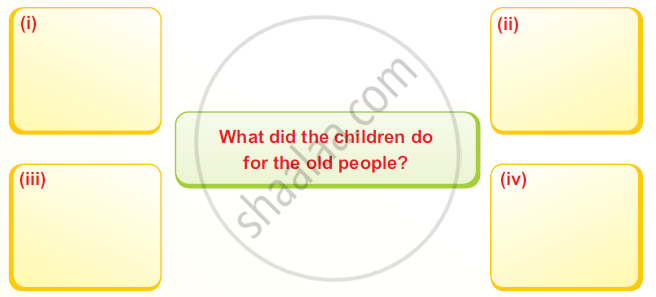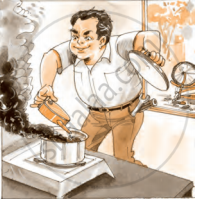Advertisements
Advertisements
प्रश्न
It was my business to cross the bridge, explore the bridge head 3 beyond and find out to what point the enemy had advanced. I did this and returned over the bridge. There were not so many carts now and very few people on foot, but the old man was still there.’’Where do you come from?” I asked him.
“From San Carlos,” he said, and smiled.
That was his native town and so it gave him pleasure to mention it and he smiled.
“I was taking care of animals,” he explained.
“Oh,” I said, not quite understanding.
“Yes,” he said, “I stayed, you see, taking care of animals. I was the last one to leave the town of San Carlos.”
He did not look like a shepherd nor a herdsman and I looked at his black dusty clothes and his gray dusty face and his steel rimmed spectacles and said, “What animals were they?”
“Various animals,” he said, and shook his head. “I had to leave them.”
Read the extract given below and answer the question that follow.
What gave the old man pleasure?
उत्तर
When he said the name of his hometown aloud, it gave the old man pleasure.
APPEARS IN
संबंधित प्रश्न
The passing of time will no longer affect her, says the poet. Which lines of the poem say this?
The teacher will read out the story of a young girl about a special day.
One day our teacher announced that there was a surprise awaiting us the next day. We were asked to get whatever little pocket money we could.
The next day our teacher said, 'Today is Grandparents' Day' and you will be meeting many grandparents who do not live with their families. Yes, we were going to an Old Age Home! On the way we bought a nice big cake, chart paper and balloons. We entered an old, big building. Later we were taken into a hall and were allowed to decorate it.
We blew balloons and hung them around the hall. We cut out chart paper, wrote quotes, drew pictures and stuck them on the wall. Then came in all the grey–haired sweethearts, some alone, some couples, some in groups ans settled down.
It was time to welcome them. Robert, who was a good speaker, greeted them and told them that we had come along to make their day a little special. We gathered in front and started singing songs for them. Most of the people were single grandparents whose spouses had expired. The other few were couples; many of them were smiling and singing along too. But there were a few who sat without any expression. While some of us sang the others sat beside them and spoke to them.
Two of us cut the cake into several pieces to be distributed. We were informed by the caretaker that there were diabetic people amongst them and they couldn't have sweets. He said they could have fruit instead the non-diabetics and fruit to those who were diabetic. Many of them missed their grand children. One of them told me that her son was in the U.S. and as he found it difficult to look after her, he had left her at this Home.
While returning home we realized that our grandparents are lonely and insecure. They spend their second childhood in their old age homes. Most of those living in old age homes do not complain. It is left to us to decide how happy their old age can be. We do not need any special day to make them feel their worth. If you have never told them how much you love them, say it before it's too late.
(b) List any three feelings of the old people in this story.
- _____________________________
- _____________________________
- _____________________________
(c) Complete the following :
- We can make our grandparents happy by ________________
- We can avoid constructing more and more Old Age Homes by___________
Read the extract given below and answer the questions that follow:
"Now tell us what it was all about"
Young Peterkin, he cries.
And little Willhelmines looks up
With wonder - waiting eyes,
"Now tell us all about the war,
And what they fought each other for".
- After Blenheim, Robert Southey
(i) Who are Peterkin and Wilhelmine? How does the poet describe the scene at the beginning of the poem?
(ii) What did Young Peterkin find and where? Describe it?
(iii) Who is referred to as "each other"? What did they fight for?
(iv) To whom are the words in the extract addressed? How was this person's family affected by the war?
(v) What, according to the poet, are the consequences that are often associated with great and famous victories? What message does the poet want to convey to the readers?
What does the child’s mother say about snakes?
Answer the following question. (Refer to that part of the text whose number is given against the question. This applies to the comprehension questions throughout the book.)
Why did the little man grant Patrick a wish? (2)
Multiple Choice Question:
A family is made of the people who ________
Answer the following question:
Why was the shop called ‘Lucky Shop’?
Based on the following points write a story.
- Your aunt has gone to her mother’s house.
- Your uncle does his cooking.
- He is absent-minded.
- He puts vegetables on stove
- He begins to clean his bicycle outside.
- The neighbour calls out saying something is burning.
- Your uncle rushes to the kitchen.
- To save vegetables, he puts some oil in them.
- Unfortunately, it’s machine oil, not cooking oil.
- What do you think happens to the vegetables?

Begin like this: Last month my aunt decided to visit her parents...
The words helper, companion, partner and accomplice have very similar meanings, but each word is typically used in certain phrases. Can you fill in the blanks below with the most commonly used words? A dictionary may help you.
the thief’s ……………
Who do you think Mr Nath is? Write a paragraph or two about him.
